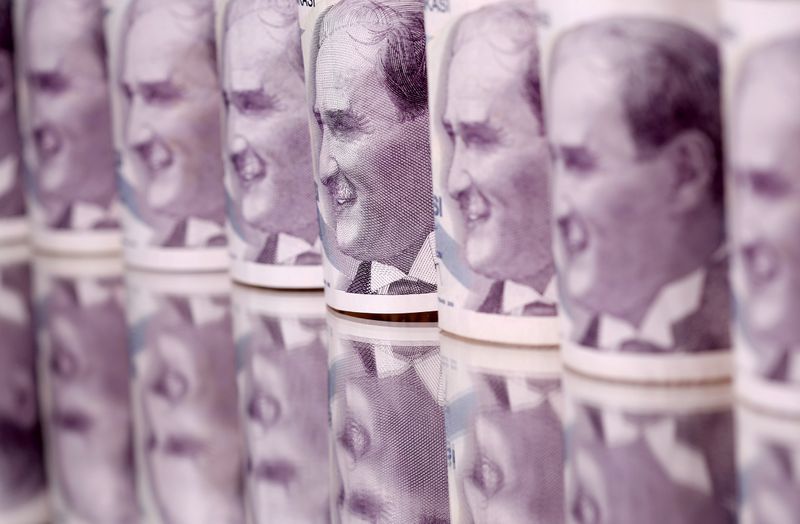By Wayne Cole
SYDNEY (Reuters) - Asian stocks turned mixed and bonds bounced on Monday as a plunge in the Turkish lira sparked talk that capital controls might be needed to stem the rout, though the wider fallout was relatively restrained for the moment.
The dollar was trading almost 12% higher versus the lira at 8.0520, the sharpest move since August 2018 when Turkish markets were in another of their periodic crises.
The slide came after President Tayyip Erdogan shocked markets by replacing Turkey's hawkish central bank governor with a critic of high interest rates.
"The authorities will be left with two choices, either it pledges to use interest rates to stabilise markets, or it imposes capital controls," said Per Hammarlund, senior EM strategist at SEB Research.
"Given the increasingly authoritarian approach that President Erdogan has taken, capital controls are looking like the most likely choice."
The uncertainty saw Japan's Nikkei fall 1.6%, partly on speculation Japanese retail investors could face losses on large long positions in the high-yielding lira.
The ripples were more modest elsewhere with MSCI's broadest index of Asia-Pacific shares outside Japan actually adding 0.3%, aided by a 0.7% rise in Chinese blue chips.
EUROSTOXX 50 futures eased 0.3% and FTSE futures 0.2%. Nasdaq futures firmed 0.6%, while S&P 500 futures dithered either side of flat.
Yields on 10-year Treasury notes edged down five basis points to 1.68%, suggesting some favoured safe havens.
Investors are still struggling to deal with the recent surge in U.S. bond yields, which has left equity valuations for some sectors, particularly tech, looking stretched.
Bonds had another wobble on Friday when the Federal Reserve decided not to extend a capital concession for banks, which could lessen their demand for Treasuries.
The damage was limited, however, by the Fed's promise to work on the rules to prevent strains in the financial system.
A host of Fed officials speak this week, including three appearances by Chair Jerome Powell, providing plenty of opportunity for more volatility in markets.
WATCHING EMERGING MARKETS
Monday's tumble in the lira saw the yen firm modestly, with notable gains on the euro and Australian dollar. That in turn dragged the euro down slightly on the dollar to $1.1890.
After an initial slip, the dollar soon steadied at 108.80 yen, while the dollar index was down slightly at 91.973.
Also supporting the yen were concerns Japanese retail investors that have built long lira positions, a popular trade for the yield-hungry sector, might be squeezed out and trigger another round of lira selling.
Still, analysts at Citi doubted that the episode would lead to widespread pressure on emerging markets, noting the last time the lira slid in 2020, there was little spillover.
"In terms of impact on other parts of the high-yielding EM, we believe that will be quite limited," Citi said in a note.
There was scant sign of safe-haven demand for gold, which eased 0.2% to $1,741 an ounce.
Oil prices fell anew, having shed almost 7% last week as concerns about global demand prompted speculators to take profits on long positions after a long bull run. [O/R]

Brent was off 32 cents at $64.21 a barrel, while U.S. crude for May fell 33 cents to $61.10.